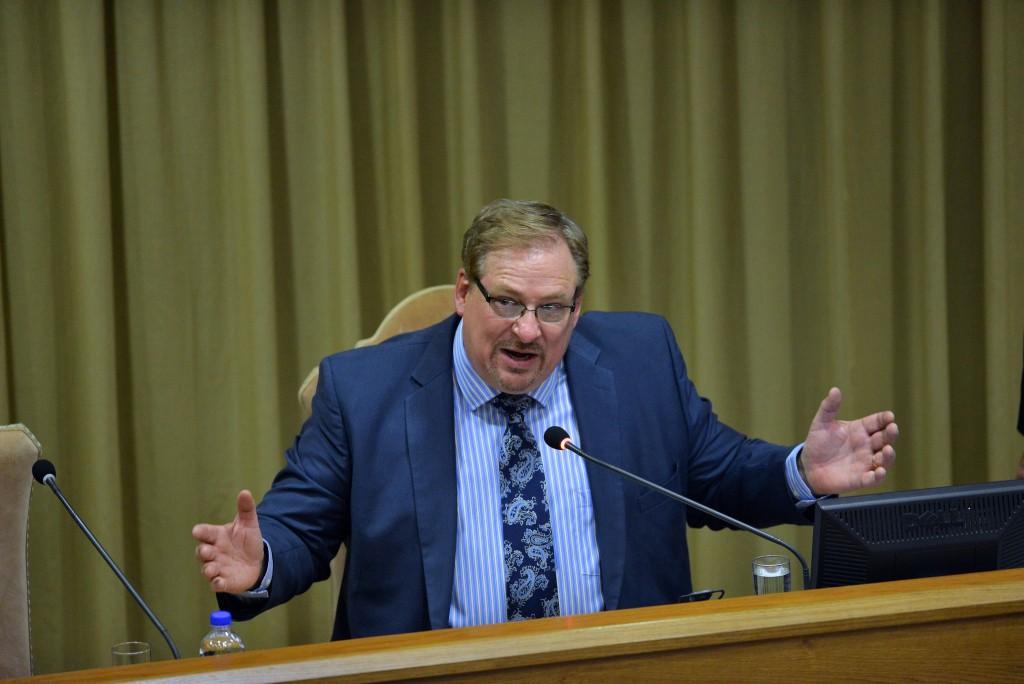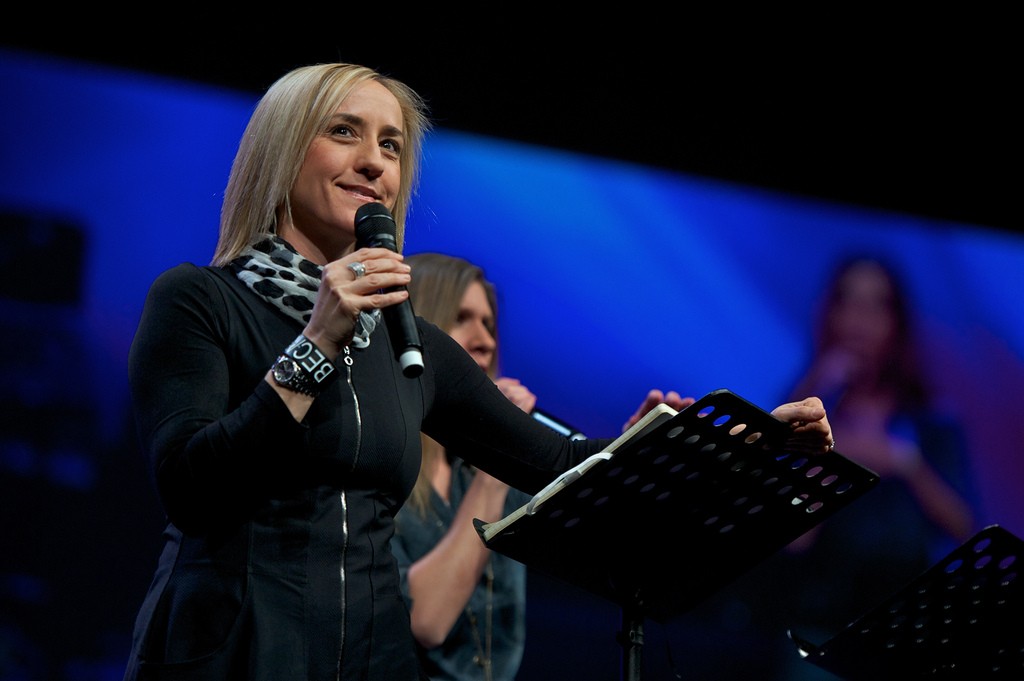While most observers wait for evangelicals to shift on marriage, the more salient debates taking place within conservative Protestantism concern women’s roles in church, family, and society.
Polling data reveal growing acceptance of same sex marriage, particularly among young evangelicals, though relatively few evangelical leaders who were not already supportive of progressive political causes have come out for same sex marriage.
Yet, even within institutions and sectors where views on homosexuality are fairly uniform, when it comes to gender roles there exists considerable variation in beliefs about what the Bible requires, what institutions will allow, and what women themselves should prefer.
Acceptance of homosexuality is often an excommunicable offense, but evangelical leaders may have to accommodate more egalitarian gender roles. Women are challenging entrenched notions of patriarchy, but as long as they agree that homosexual expression is a vile sin they can remain comfortably within the conservative evangelical fold.
The Rev. Christine Caine, a popular Australian evangelist and anti-human-trafficking advocate, has launched a “Lean In”-type program and Propel, a magazine for women who lead in the professions. Liberty University hosted Propel Women’s inaugural event this winter on its Lynchburg, VA campus.
Founded by Jerry Falwell as a fundamentalist Bible academy, Liberty has grown into an evangelical mega-college with more than 12,000 students in residence and nearly 100,000 enrolled online. A bastion of cultural conservatism, Liberty seems an unlikely place to celebrate women reaching for the heights of influence in business and government.
But unless Propel aims to convince women to quit their careers, stop taking birth control, and homeschool their children, it will be in direct conflict with some evangelical elites’ expressed preferences.
Liberty’s vice president, the father of an “audacious and passionate daughter,” enthusiastically affirmed Propel’s mission. One can only imagine that many other leaders, who no doubt want their daughters to be passionate about homemaking, will look on in horror. How many of The Gospel Coalition’s council members (52 men, 0 women), for example, support Propel, the brainchild of a woman pastor?
Beth Moore, a prominent Bible teacher whose speeches would be called sermons were she a man, also spoke at the Liberty event. Her presence conferred a degree of legitimacy on Propel Women, since most conservative evangelical leaders endorse Moore’s books and conferences, which are wildly popular among their female congregants.
Evangelicals also are divided over women’s roles in parachurch organizations and denominational institutions, where women’s leadership lags behind the general marketplace.
Last year, the Ethics & Religious Liberty Commission—the Southern Baptist Convention’s public policy agency—named 72 fellows to its Research Institute. (“Fellows” is an apt name as only three were women.)
Some evangelical colleges and seminaries perennially debate whether women professors are qualified to teach male students in theological disciplines. In one prong of a thoroughgoing administrative crackdown, Cedarville University in Ohio, for example, forced out a tenured female Bible professor. The new female religion instructor is only permitted to teach women.
One notable exception to the institutionalization of Christian patriarchy is evangelicalism’s flagship magazine, Christianity Today. Its women’s blog has a number of writers with diverse perspectives on women’s roles and many other issues.
Ridiculing stay-at-home dads as “man fails,” the Council for Biblical Manhood and Womanhood encourages evangelicals to live by the tenets of patriarchy (now rebranded as “complementarianism.”) Still many evangelical women often prefer egalitarian marriages, and they don’t seem to believe that puts them in defiant rebellion against God.
Of course, there is great variation among those who employ the term “complementarity.” It figures prominently in Catholic teaching and was the subject of a major conference Pope Francis convened last fall at the Vatican, one attended by prominent American evangelical and Mormon as well as Catholic leaders.
The controversy revolves around whether and how complementarity should inform modern marriage and family life. Under the current pope at least, Catholic vive la différence complementarity is flexible enough to accommodate women’s educational and professional aspirations, whereas conservative evangelical complementarity more strongly idealizes housewifery and stay-at-home motherhood.
Some evangelicals’ complementarian commitments appear to be influenced more deeply by nostalgia for 1950s suburbia than by the Bible itself. The gulf between leaders’ wishes and women’s lives reveals how tone-deaf, incomprehensible, and inconsistent elite preferences have become.
The complementarian leaders behind the Danvers Statement, drafted in 1987, point out that it doesn’t explicitly forbid women from working and leading in professional settings as long as they view their responsibilities as wives and mothers as paramount. But this sentiment is largely betrayed by conservative evangelical elites’ evident preferences and rhetoric.

Evangelical powerhouse, the Rev. Rick Warren of Saddleback Church in Southern California, addresses the Vatican conference Humanum: An International Interreligious Colloquium on the Complementarity of Man and Woman, in November 2014. Photo via Flickr/Humanum IT.
Traditionalist evangelical elites may have overreached. Now, in light of the preferences and necessities that undergird evangelicals’ egalitarian family arrangements, leaders will have to concede that people can interpret scripture according to shifting cultural realities. Of course, this interpretive malleability and liberty of conscience isn’t extended to people who think differently about homosexuality.
At the Liberty University event, Caine, the Australian clergywoman, expounded on her belief that Christ “affirms and acknowledges every woman’s gifts, passions, and leadership potential.” Given Propel’s fundamental disagreement with key tenets of Christian patriarchy, it will be interesting to see which complementarian leaders speak out against it.
There doesn’t appear to be much middle ground here; either complementarian wives and daughters can be MBAs and CEOs or they cannot.
Conservative evangelical elites are expending a great deal of energy to keep acceptance of homosexuality out of their churches and institutions. But when it comes to enforcing patriarchy, they simply aren’t fighting as hard. As they battle on two fronts—often against their own people—evangelical leaders may have to decide whether homosexuality or egalitarianism is the greater evil.
They will struggle to argue that marriage is non-negotiable as they concede that gender roles are very much up for debate.
Featured image via Roadside Pictures/Flickr. Photo of the Rev. Christine Caine via Flickr/.



